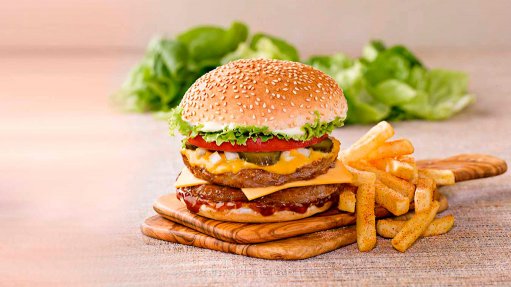
Despite challenging trading conditions, food services franchisor Famous Brands posted a 17% increase in gross profit to R404-million for the six months ended August 31.
CEO Darren Hele said in a statement that the group’s unwavering focus on consistent improvement and investment in the business continued to deliver rewarding results.
Speaking to Engineering News Online, he noted that the company had a deliberate growth strategy and that the recent additions of new business to its portfolio was not a shopping spree.
“We are an ambitious bunch,” he quipped.
“Management’s strategic drive to build capability and capacity across our brands, logistics and manufacturing operations continued apace, with the successful integration of recently acquired businesses and the acquisition of additional new businesses,” he added.
Further, the company, which owns Wimpy, Tashas, Vovo Telo, Steers and Mythos, besides others, saw its basic earnings a share grow 62% to 391c apiece, while headline earnings a share increased 71% to 411c apiece.
However, Famous Brands’ operating margin declined to 16.5% primarily as a function of investment in resources to enhance operational capabilities, a higher percentage of joint venture entities in the system and the lower-margin manufacturing business.
With the integration of the recently acquired Gourmet Burger Kitchen’s 80 company-owned restaurants over the forthcoming period, softer margins are expected.
Also, as a result of the acquisition, the company’s gearing is “substantially higher” than prior years, which prompted Famous Brands to not declare a dividend for the interim period.
The vertically integrated company has a portfolio of 30 brands represented by a franchise network of 2 626 restaurants across South Africa, the rest of Africa, the Middle East and the UK.
Notwithstanding the adverse trading environment, the group also opened 75 new stores across the brand portfolio, on par with the prior comparative period.
Hele, who succeeded Kevin Hedderwick as CEO of the group in December, commented that his focus was on bedding down and integrating the acquisitions to extract value. He added that there was still room for growth as the country’s urban landscape changed.
He also revealed that the company could possibly re-enter the sweet tooth market, competing with the likes of Dunkin’ Donuts and Krispy Kreme, which have recently entered the local market. “I’ll never say never,” he said, noting that it was an opportunity that was being watched with interest.
TURNING PAGE
One of the acquisitions completed during the half-year was a tomato paste manufacturing plant, formerly Cape Concentrate, situated in the Coega precinct, in the Eastern Cape.
The facility was bought out of liquidation at a significantly discounted purchase consideration. The plant will manufacture product for the group’s franchise network, as well as third-party retail customers.
It is anticipated that the operation will be partially commissioned by the end of February, with development of the grower-supply network already under way.
Hele explained that the company would mainly engage in offtake agreements with suppliers.